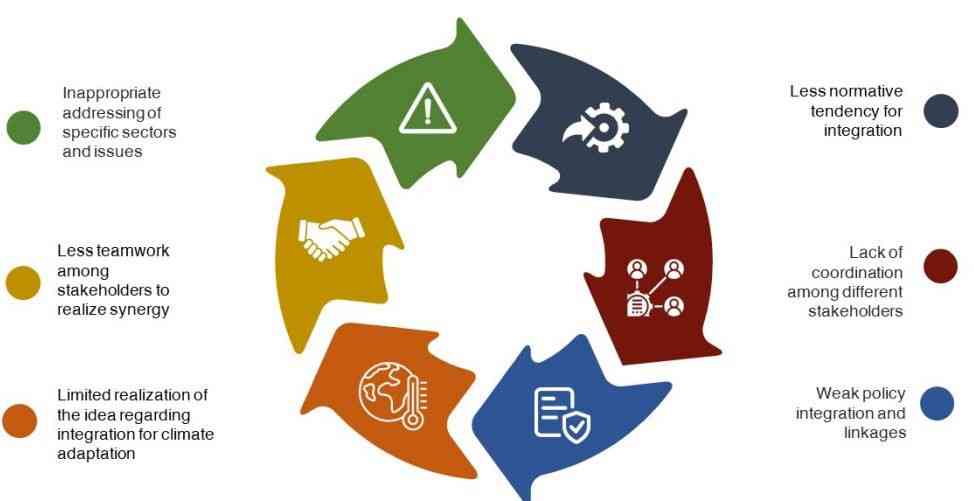
CLIMATE change is already impacting Africa disproportionately and will continue to do so, primarily by affecting the sectors that are key to the livelihoods of vulnerable communities, such as agriculture, forestry, and fisheries.
In addition to bearing the brunt of climate change and other environmental degradation challenges, Africa is often underrepresented in global climate change mitigation and adaptation efforts across multiple dimensions, from research and development, to policy and advocacy to on the ground implementation.
Valuable leadership, expertise, and context-specific knowledge are missing at the decision-making table, leading to uninformed and ineffective solutions.
Institutional capacity strengthening is, therefore, seen as one of the drivers of climate-resilient development by enabling the development of transformative solutions to deal with climate challenges.
There is a growing climate intervention gap in Africa, with the continent continuing to lag behind all other regions of the world in climate adaptation, despite various initiatives’ efforts.
The widening gap is caused, among other factors, by the ever-increasing reliance on external support for climate actions, persistent poverty, and socioeconomic inequality, low levels of development, limited economic capacity, and poor governance.
In addition, the disproportionate impacts of climate change on youth and women remain a challenge needing urgent redress.
- Open letter to President Mnangagwa
- Feature: ‘It’s worse right now than under Mugabe’: Sikhala pays the price of opposition in solitary cell
- Masvingo turns down fire tender deal
- Human-wildlife conflict drive African wild dogs to extinction
Keep Reading
Adaptation and resilience building remains a priority as the continent prioritises adaptation over mitigation, but there are huge potential gains if the continent pushes adaptation and unlocks mitigation potential in general.
The need for capacity building in climate adaptation and resilience remains huge, as noted in the February 2020 African Union meeting that reviewed the implementation of the Malabo Declaration.
Such capacity gaps are evident at national, regional, and continental levels.
With the African population expected to reach 2,4 billion by 2050 and relying on a predominantly rain-fed agricultural system, critical work must be undertaken to ensure that the continent can be food secure.
The African Union Climate Change and Resilient Development Strategy and Action Plan (2022–2032) has identified capacity building as one of the key priorities under Strategic Intervention.
The strategy prioritises institutional, technical, relational, and strategic capacity development for delivering climate adaptation and low-emission, climate-resilient development on the continent.
Digital transformation remains critical to climate adaptation and resilience not only in the focus countries but throughout the African continent.
Tracing digital challenges along the agriculture value chain reveals that Interactive Voice Response (IVR)/Short Message Service (SMS) could be used for advisory services and solutions at the agricultural input point. Digitised farm records help to establish credit lines, while satellites and drones could be used to enhance remote sensing and land or crop monitoring, with the Internet of Things adopted for efficient resource use at the production stage.
Database technologies may be used to optimise postharvest losses and retain product quality in distribution, while IVR/SMS remains viable in promoting nutritional advisory information.
Because climate change affects crop and plant production, farmers need to cushion themselves against climate change by investing in appropriate adaptation measures.
Crop production is fundamental for reducing poverty and ensuring food and nutrition security across the world.
Climate change has deep impacts on crop yields and is causing ecological shifts in cropland suitability for crop production.
The changes in agroecological zones have severe consequences for land-use patterns, biodiversity, socio-economics, and agricultural productivity, although future temperature increases may conversely open up new areas for crop production.
The success of the adaptation strategies decides the community’s crop production systems as well as crop yield, which will, therefore, determine the food security situation of a place.
Weak strategies are likely to compromise crop production systems and crop yields and thus food security.
Recommendations
Determine the extent to which the Africa-based and Africa-led organisations mapped delivery of climate adaptation services in agriculture to provide solid decision-making information in selecting institutions that have a stronger potential to deliver climate adaptation services in agriculture before capacity needs assessment. Such assessment is vital to further identify capacity gaps for the effective delivery of climate adaptation interventions in agriculture and to determine what capacity intervention measures will be needed.
Establish the nature and extent to which recommendations support climate adaptation because they have several departments or specialised institutions dealing with disaster risk reduction and management, and with climate change adaptation and resilience in the agricultural sector. There is no information on how the different departments or institutions under the regional economic communities coordinate their interventions in climate adaptation. Further research is needed to establish the nature and extent of this work, including funding mechanisms, partners involved, and good practice cases for learning and capacity building purposes.
Address programme and project continuity challenges stemming from short funding cycles because many activities in climate change adaptation and resilience are financed on a programme or project basis, which brings discontinuity and loss of institutional memory. Research is needed on sustainable funding mechanisms for African climate change adaptation and resilience in agriculture.
Investigate and identify quick and big wins for women in adaptation and resilience building in agriculture, because women dominate small-scale farming in sub–Saharan Africa. Such interventions could also identify hot-spot areas.
Determine the potential long term impacts of the Covid-19 pandemic on adaptation in agriculture. While Covid-19 had clear short- to medium-term severe negative impacts on the capacity of many national departments and NGOs working in climate adaptation and resilience, potential long term impacts remain undocumented. Further investigation is needed to identify and develop the institutional capacities required to implement transformative solutions for responding to potential future Covid-19 impacts.
Promote mapping and upscaling of use cases of digital technologies for adaptation. Given the growing uptake of digital technology under the “Fourth Industrial Revolution”, the full potential of digital technology should be tapped to accelerate climate adaptation and resilience in agriculture through mapping pilot applications cases, consolidating lessons and good practices, and upscaling and disseminating.
- Zvendiya is an independent researcher. — [email protected]. These weekly New Perspective articles, published in the Zimbabwe Independent, are coordinated by Lovemore Kadenge, an independent consultant, managing consultant of Zawale Consultants (Pvt) Ltd, past president of the Zimbabwe Economics Society and past president of the Chartered Governance & Accountancy Institute in Zimbabwe (CGI Zimbabwe). — [email protected] or mobile: +263 772 382 852.






